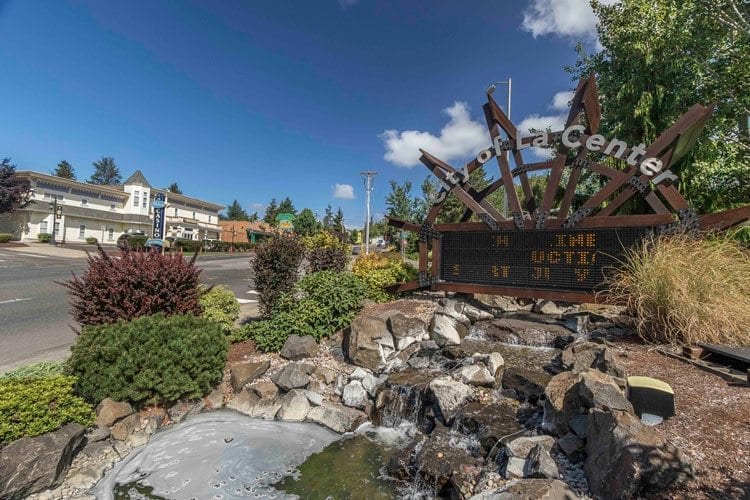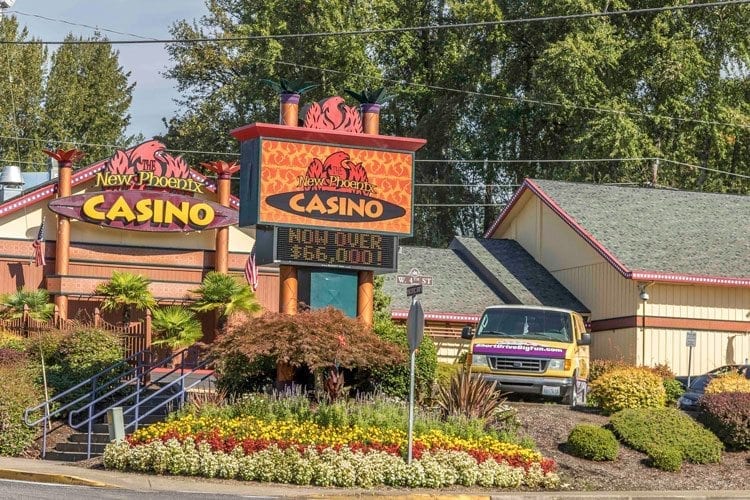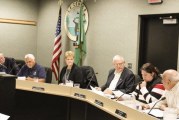Members of La Center City Council asked to cut tax in half for final three months of 2017
LA CENTER — The owners of the two remaining card rooms in La Center have asked the city of La Center for a temporary reduction in the gambling taxes they pay to the city.
Citing increased challenges in the ability to keep their businesses profitable, the owners of the Last Frontier and Palace casinos have requested that members of the La Center City Council approve a reduction in the gambling tax from 10 percent to five percent for the remaining three months of 2017. The owners have also asked city officials to enter into a discussion about an alternative tax rate structure in the future.
“This is a very serious situation for our city right now,’’ said La Center Mayor Greg Thornton, who previously raised the issue of reducing the gambling tax during the 2017 budget process. “It’s important that the city consider it and take a serious look at it.’’

At a workshop prior to their regularly scheduled meeting Wednesday, Thornton and the members of the La Center City Council were given a presentation by consultant Paul Lewis, who works with the city’s Budget Advisory Committee.
Lewis’ presentation showed a significant reduction in card room revenue since the opening of the ilani Casino in April. In the three months prior to the opening of the ilani Casino, La Center card room gambling tax revenue topped $250,000 each month. In the next four months after the Cowlitz Tribal casino opened its doors, the La Center gambling tax revenue never reached $200,000 in any month.
In those four months (May-through-August), the La Center card room revenue was $719,000, which represents a 16.7 percent reduction from the same four months in 2016 ($861,819). Since 2007, the La Center card room revenue has averaged 1.5 percent in annual growth.
In addition to the opening of the ilani Casino, Lewis cited other reasons for the struggles of the La Center card rooms including increased total labor costs since 2014, which are the result of:
- Higher minimum wage: reportedly 75 percent of employees
- Higher wages due to increase in wage scale due to minimum wage increase and higher wages paid by ilani
- Higher benefits costs: Affordable Care Act requirements and higher wages
- Management/administration labor costs spread over fewer labor/operating hours due to card room closure (the New Phoenix closed in March 2017 and Chips Casino closed in January 2014)
The Last Frontier Casino is owned by George Teeny, who also owned the New Phoenix. The Palace Casino is owned by a group headed by Steve Michels. That ownership group also owned the Chips Casino.
Lewis also told the council members that the card room cost structure had been hurt by construction on La Center Road and at the La Center/I-5 junction over the past nine months. Other factors included:
- An increase in “advantage’’ players due to ilani draw
- An increase in player promotions/premiums at the card rooms
- Employee recruitment/turnover/training
- Loss of value of having multiple card rooms
- Cost of maintaining closed card room properties
- Initiative 1433: Paid sick leave law effective Jan. 1, 2018
Lewis also pointed out that the decrease in card room revenue is actually less than La Center officials estimated in the city’s 2017 budget, which projected card room revenue to fall from $3,136,044 in 2016 to $1,927,910 in 2017. Lewis said current projections having the card room revenue projected to be $2,326,800 in 2017, or $398,890 more than expected.

The fact that card room revenue is ahead of the city’s own gloomy projections has one council member scratching his head about the request for a reduction in the gambling tax.
“It doesn’t make sense to me,’’ said Council Member Al Luiz.
Luiz and his fellow council members are expected to be presented with a resolution regarding the requested gambling tax reduction at their Oct. 25 meeting. A vote could be taken at that time.
“I have an issue reducing monies coming in from businesses,’’ Luiz said. “I might find it hard to justify reducing taxes on a business when you have other businesses in town dealing with the same issues.
“It’s a business plan,’’ Luiz added. “They have to work it out. I don’t think it’s the city’s responsibility to do that. A business has to stand or fall on its own merit.’’
The rest of the members of the council seemed more receptive to the request for the reduction.
“The relationship we’ve had with them has been very beneficial to the city,’’ said Council Member Joe Valenzuela said. “I’ve never seen such a goose with a golden egg at any of the five cities I’ve worked at.’’
Valenzuela pointed out that La Center has yet to follow through on its plans to diversify its tax base by attracting new businesses to the city, therefore keeping it in a position of being extremely dependent on the card room revenue, which still accounts for more than 50 percent of the city’s general fund revenue.
“We’ve got ourselves in this situation where we are totally dependent on them,’’ Valenzuela said. “If these guys go away, the entire structure of the city will change.’’
Council Member Liz Cerveny believes it will be easier for La Center to attract new businesses to the city if the card rooms are still operating.
“All along we have talked about working with local businesses and that includes the card rooms,’’ Cerveny said. “Having them here is far more beneficial to attracting other businesses.
“I worry about getting that phone call and to hear they are closing tomorrow,’’ Cerveny said. “That is not something I want to hear.’’
At Wednesday’s workshop, La Center City Attorney Daniel Kearns pointed out that the Last Frontier missed its monthly gambling tax payment due to the city on Oct. 1. He also encouraged council members and city officials to encourage Teeny and his staff at the Last Frontier to make that payment, including any late fees, prior to the council being presented with a resolution that would reduce the gambling tax.
“Compared to what they’ve contributed to the community over the years, it’s not a big chunk to consider,’’ Council Member Randy Williams said of the reduction. “It seems like a fair thing. If they do better, we do better.’’
La Center looks to new taxes to help plug expected revenue losses

Lewis projected that the requested three-month reduction would equate to a reduction of $225,000 in gambling tax payments to the city in the final three months of 2017.
Council Member Heather Birdwell-Currey suggested a smaller reduction than the 5 percent that was requested.
“I think 5 percent is a lot,’’ said Birdwell-Currey. “I think somewhere in the middle, say 3 percent. That might be a more reasonable reduction.’’
Thornton reiterated that the reduction would only be temporary.
“This three-month period will give us a period of time to use to better understand what the card rooms are going through,’’ Thornton said.
In addition to the proposed reduction in gambling taxes, the council members also expressed a willingness to consider a deferral of a scheduled utility excise tax, that went into effect Oct. 1. The utility tax was intended to help diversify the city’s revenue sources and help offset the reduction in card room tax revenue by generating an estimated $330,000 in revenue in 2017.
Because that tax has already went into effect, any deferral will likely not be allowed until the first quarter of 2018.
“We don’t want to see another tax if we don’t need it,’’ Williams said.
Under pressure, city of La Center passes 2017 budget, preps for severe revenue shortfalls in years ahead





